Suchergebnisse für "Factsheet: Energietechnologien gestalten, die für alle sinnvoll und nutzbar sind"
KELVIN - Reduktion städtischer Wärmeinseln durch Verbesserung der Abstrahleigenschaften von Gebäuden und Quartieren
Potentialabschätzung einer möglichen Abschwächung des Auftretens städtischer Wärmeinseln durch die Veränderung der Oberflächenalbedo unterschiedlicher Stadtstrukturen (Boden, Dachflächen, Dachbegrünung etc.) bzw. damit verbundener Energieeinsparung durch Reduktion des Kühlungsbedarfs und Emissionsreduktion, um positive Auswirkungen auf Gesundheit und Lebensqualität (Human- und Wohnkomfort) in Städten zu ermöglichen.
EnergieRaumPlanung für Smart City Quartiere und Smart City Regionen (ERP_hoch3)
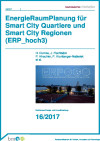
Schriftenreihe
16/2017
H. Dumke, J. Fischbäck, P. Hirschler, P. Kronberger-Nabielek, et al.
Herausgeber: BMVIT
Deutsch, 422 Seiten
Downloads zur Publikation
Ergebnisband „Klimaneutrale Städte"
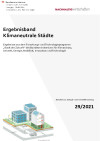
Der vorliegende Ergebnisband stellt abgeschlossene Projekte aus dem Forschungs- und Technologieprogramm „Stadt der Zukunft“ des Bundesministeriums für Klimaschutz, Umwelt, Energie, Mobilität, Innovation und Technologie (BMK) im Bereich Klimaneutrale Städte vor. Die gewonnenen Erkenntnisse sollen eine Entwicklung in Richtung energieeffiziente und klimaverträgliche Stadt unterstützen, die auch dazu beiträgt, die Lebensqualität und die wirtschaftliche Standortattraktivität zu erhöhen.
Schriftenreihe
29/2021
Redaktionelle Gestaltung: Bianca Pfefferer, Hannes Warmuth (ÖGUT)
Herausgeber: BMK
Deutsch, 22 Seiten
Downloads zur Publikation
Stadtquartiere mit optimierten solar-hybriden Heiz- und Kühlsystemen (CiQuSo)
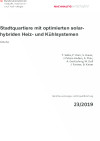
Das Forschungsansuchen untersucht, evaluiert und optimiert effiziente Systemlösungen zur solaren Energieversorgung auf Gebäude- und Stadtquartiersebene. Die Anwendbarkeit der entwickelten Konzepte wird am Beispiel des Salzburger Stadtquartiers Itzling demonstriert.
Schriftenreihe
23/2019
T. Selke, P. Horn, S. Hauer, J. Peters-Anders, A. Thür, A. Goritschnig, W. Doll J. Furtner, B. Kaiser
Herausgeber: BMVIT
Deutsch, 81 Seiten
Downloads zur Publikation
KELVIN - Reduktion städtischer Wärmeinseln durch Verbesserung der Abstrahleigenschaften von Gebäuden und Quartieren
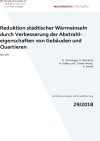
Potentialabschätzung einer möglichen Abschwächung des Auftretens städtischer Wärmeinseln durch die Veränderung der Oberflächenalbedo unterschiedlicher Stadtstrukturen (Boden, Dachflächen, Dachbegrünung etc.) bzw. damit verbundener Energieeinsparung durch Reduktion des Kühlungsbedarfs und Emissionsreduktion, um positive Auswirkungen auf Gesundheit und Lebensqualität (Human- und Wohnkomfort) in Städten zu ermöglichen.
Schriftenreihe
29/2018
H. Schwaiger, D. Neil Bird, H. Gallaun, M. Zuvela-Aloise, K. Andre
Herausgeber: BMVIT
Deutsch, 97 Seiten
Downloads zur Publikation
G2G – Innovationsachse Graz-Gleisdorf
Entwicklung von Test- und Demonstrationsgebieten im Rahmen von ausgewählten Stadt(teil)entwicklungsvorhaben entlang der Innovationsachse Graz-Gleisdorf mit Fokus auf die Bereiche Energie, integrierte Gebäudetechnologien, smarter Stadtraum, kompakte Siedlungsstruktur, Nutzungsmix - Stadt der kurzen Wege, Generationenwohnen, intermodale Mobilität sowie Informations- und Kommunikationstechnologien (IKT).
CO2 neutrale Stadtteilentwicklung Itzling
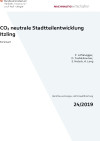
Ziel des Projekts „Itz Smart“ ist die Anknüpfung an bestehende Aktivitäten und die konsequente Weiterentwicklung des Wohnstandorts Itzling. Im Test- und Demonstrationsgebiet werden im Bereich der Verkehrsachse (Bahn und Schillerstraße) bzw. angrenzend an die Nahversorgungsachse (Itzlinger-Hauptstraße) nachhaltige Wohnquartiere mit zukunftsweisenden Mobilitätslösungen entwickelt. Die Betrachtung von „Wohnen und Mobilität“ zieht unter dem Aspekt „Stadt der kurzen Wege“ auch die Auseinandersetzung mit gezielter Mischnutzung und der Entwicklung solcher Quartiere nach sich.
Schriftenreihe
24/2019
P. Lüftenegger, D. Teufelsbrucker, S. Netsch, A. Lang
Herausgeber: BMVIT
Deutsch, 108 Seiten
Downloads zur Publikation
Workshop: Roadmap zur integrierten urbanen Solarenergienutzung
3. Oktober 2016
FH Joanneum, Alte Poststraße 154, 8020 Graz
Bei diesem Stakeholderworkshop wird der Entwurf der Roadmap zur integrierten urbanen Solarenergienutzung vorgestellt. Außerdem erhalten Sie als ExpertInnen die Möglichkeit sich in die Gestaltung der Roadmap einzubringen.
URSOLAR - Optimierung der SOLARenergienutzung in URbanen Energiesystemen
URSOLAR stellt EntscheidungsträgerInnen eine Roadmap zur integrierten urbanen Solarenergie-nutzung zur Verfügung. Es wird aufgezeigt, wie Photovoltaik (PV) und Solarthermie angepasst an infrastrukturelle und rechtliche Gegebenheiten in idealtypischen Stadtquartieren aus ökonomischer, ökologischer und sozialer Sicht sowie unter Berücksichtig von Stakeholder-Interessen optimal ge-nutzt werden können.
Zertifizierung von Siedlungen / Quartieren
Sondierungsprojekt zur Übertragbarkeit des Schweizer Systems der 2000-Watt Arealbewertung auf Österreich
E_PROFIL - neighborhood profiles for optimized energy transformation processes
E_PROFIL is a set of methods (an IT-supported toolkit) for the elaboration of neighbourhood profiles. The aim of the project is to facilitate an energy and resource efficient development in the planning practice of Austrian cities. Furthermore, the project is an important asset for research and planning activities in Europe and can also be applied to other neighbourhoods.
Itz Smart – Carbon neutral city district development Itzling – Implementing innovation and technology via co-operative process design
The goal of the project “Itz Smart” is to tie in with existing activities and to consistently develop Itzling as a residential location further. In the test and demonstration area, sustainable residential quarters with trendsetting solutions for mobility are developed in the zone of the transport axis (railway and Schillerstraße) and along the local supply axis (Itzlinger Hauptstraße). The consideration of housing and mobility with regard to the aspect of “city of short ways“ also entails a discussion of determined mixed utilisation and the development of such residential quarters.
PEAR – Test facility for energy efficient automation and control of buildings
The energy demand calculated in the design phase often differs from measured values in the actual building operation. This projects reviews building automation and operation by presenting a solution how to assess energy efficiency of control strategies in the fields of air conditioning systems, concrete core activation and free cooling. The results are implemented in the demonstration building "Post am Rochus".
Smart Services for resource optimized energy systems in urban districts
The concept of a smart city explicitly refers to a sustainable city development. To apply smart city concepts in practice, it is essential to develop practice- and profit-oriented business models (smart services), which at the same time generate social and ecological benefits. Smart services were developed for the application in three specific city development areas and their practicability was verified in a comprehensive stakeholder process with decision makers.
SIMULTAN - Simultaneous planning environment for buildings in resilient, highly energy efficient and resource-efficient districts
This project enabled the opportunity for an essential energy efficiency increase within overlapping buildings, to achieve the objective of resilient cities and districts with respect to a high quality of life, resource sustainability and energy efficiency. The goal was a workable tool based on a multidisciplinary planning approach, to support the decision finding process in order to design both refurbishment projects and new developments within a highly efficient city.
ÖKO-OPT-QUART - Economically optimized control and operating mode of complex energy networks of future city districts
In the project ÖKO-OPT-QUART energy-based, economic and control-orientated models will be developed in order to simulate the operating mode of complex, sustainable energy networks in city districts. For an exemplary configuration these models will be combined to an overall model which allows a realistic economic comparison of different control strategies. The final goal of the project is the development of a method for the systematic design of cost-optimized, predictive control strategies for complex energy networks in city districts.
URSOLAR - Optimization of SOLAR energy usage in URban energy systems
URSOLAR provides decision makers with a roadmap for the integrated use of solar energy in urban environments. The roadmap shows, how photovoltaics- and solar-thermal installations can be used in an ecological, economical and socially optimal way whilst considering legal requirements as well as infrastructural conditions in typical city quartiers and stakeholder interests.
Site certificate
Possibilities and requirements of transferring the Swiss “2000-Watt Site” certificate to Austria
urban pv+geotherm - Innovative concepts for the supply of large volume buildings/ quarters with PV and geothermal energy
The use of renewable energies in inner city locations is mostly linked to higher costs andconsidered as problematic. The aim of this project was to optimize (cost and energy) heating (and where required, cooling) using geothermic and photovoltaic for an urban, densely-built development area. With the project´s findings it will be easier to ecologically and economically plan the use of renewable energies especially in urban areas.
KELVIN - Reducing the urban heat island effect via improving the reflective properties of buildings and urban areas
The aim of this project was to estimate the potential to reduce urban heat islands via low-tech measures such as the variation of the surface albedo, using the City of Vienna as an example. The project has also assessed the energy savings and greenhouse gas emission reductions due to the decreased energy demand for cooling as a result of such measures.
